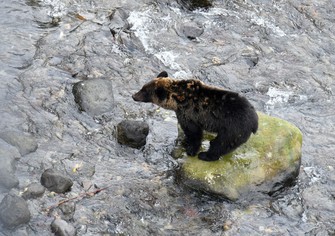'Shoot without hesitation': Japan experts warn of nonhibernating 'sleepless bears'
(Mainichi Japan)
MORIOKA -- Japan is seeing what appears to be an endless number of bear attacks across the country this year. While fewer incidents are expected as winter looms and the animals go into hibernation, there are apparently bears that don't sleep for the season. The Mainichi Shimbun asked some experts about these "sleepless bears."
Teruki Oka, head of the Forestry and Forest Products Research Institute Shikoku Research Center in the city of Kochi, has experience in bear research in northeast Japan's Iwate Prefecture. According to him, in the typical hibernation stages, bears get plenty of nutrition during fall to fatten up before holing up in trees or subterranean dens until spring. "They don't wake up in the middle of hibernation to search for food, but stay where they are," Oka said.
This is a behavioral pattern common to brown bears in the northernmost prefecture of Hokkaido and Asian black bears in northeast Japan. In the case of Asian black bears in Iwate Prefecture, they go into hibernation as early as November and sleep to around early May the following year. But this year, Japan is seeing an extremely poor beech nut harvest -- a major source of nutrition for the animals.
While some bears are expected to start hibernating earlier than usual this year to conserve energy due to the lack of food, Oka said, "The bears that didn't eat enough and couldn't prepare (to sleep) could keep wandering around without hibernating." He pointed out that bear sightings have been reported in December and January.
There are also animals known as "urban bears" that appear in densely populated city and town centers. They've become used to humans as they repeatedly come down to people's dwellings to root through household garbage. Oka warns, "People need to take precautions to keep bears away, by making sure that household garbage is properly disposed of even in the winter."
Meanwhile, environmental studies expert Hiromi Taguchi, a professor emeritus at Tohoku University of Art & Design in the city of Yamagata who has spent years researching hunting culture, points out that there is always a certain number of bears that prefer meat, even when there's an abundance of nuts.
A recent example is the male brown bear codenamed "OSO18," which had attacked more than 60 cattle in east Hokkaido towns over four years beginning in 2019.
According to Taguchi, some of the bears that prefer meat don't hibernate and continue to move about even as the weather turns cold, adding, "They're hungry and agitated in the winter due to the lack of prey animals." He said these bears remember how to attack other animals, and that's why they also attack humans.
"It's common knowledge among hunters in northeast Japan, known as 'matagi,' to shoot such bears without hesitation if they spot one," Taguchi stated. He added, "When we have a warm winter, bears' body temperatures don't drop enough, meaning that they may not be able to hibernate." Caution is especially called for when going into the deep mountain snow for skiing and other activities.
(Japanese original by Yuki Tsurita, Morioka Bureau)
Related Articles
- Hokkaido's cattle-killing brown bear 'OSO18' likely dead; authorities checking DNA
- Editorial: As bear attacks hit record high in Japan, gov't measures needed to protect lives
- Action needed over 'unprecedented' annual pace of bear attacks in Japan: ministry
- 'Failed harvest' of beech nuts across northeast Japan may be behind surge in bear attacks



